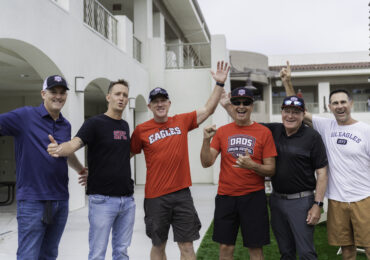Episode Show Notes
In this episode, Mike sits down with SFC’s Head of Schools, Rod Gilbert, for the second installment of the Eagle Perspective’s new mini-series “A Yard of Books.” Mike and Rod talk about the five characteristics of leadership, how to apply the characteristics and how to build effective relationships all through their discussion of The Leadership Challenge.
Mike Siciliano, High School Dean of Students, has a long history with Sante Fe Christian, sitting in several roles including alumnus, US history teacher, and football coach. As a student, Siciliano felt he had teachers and coaches who personally invested in him and made a huge difference in his life. Now, he tries every day to continue that legacy for current SFC students, live up to the standard his teachers set for him, and have a lot of fun.
Rod Gilbert brings a fresh perspective as SFC’s Head of Schools. As a strong leader with a shepherd’s heart, Rod encourages SFC’s faculty, coaches, and staff to strive for excellence in all they do. At his core, Rod is an educator who wants children and their parents to see the world as something lovely, worth exploring and redeeming through Christ.
Highlights
00:00:49 – Why Rod reads books about leadership
00:02:23 – Why they chose The Leadership Challenge for the second Yard of Books episode
00:04:15 – Five characteristics of a great boss
00:04:28 – Discussion about whether characteristics of leadership come naturally while others don’t
00:07:51 – How to enable employees to act
00:10:04 – How Rod uses the five characteristics with those around him
00:12:46 – Explanation of “challenge the process”
00:13:51 – Definition of “B-ring”
00:14:19 – How to create effective relationships with people
00:18:16 – Suggestions for how to apply the book
Transcript
Mike Siciliano [00:00:04] Welcome back to another episode of our Eagle Perspective Podcast. I am Mike Siciliano, Dean of Students of the High School. I’m here today with our head of schools. Mr. Rod Gilbert, and we are continuing in our series of A Yard of Books, books that are meaningful, significant, and can help us start conversations that are important in life. Today, Rod, you’ve brought a book for us. What book did you bring?
Rod Gilbert [00:00:28] I brought a popular leadership book called The Leadership Challenge written by two guys, Kouzes and Posner. I’m not sure if I’m saying their names right, but that’s close.
Mike Siciliano [00:00:39] It sounds good to me.
Rod Gilbert [00:00:40] Okay. I’ll just pretend like I’m doing it right.
Mike Siciliano [00:00:43] Okay. Is that part of the advice in their leadership challenge, tip number one, just pretend like you know what you’re doing?
Rod Gilbert [00:00:48] Just wing it.
Mike Siciliano [00:00:49] Yeah. Okay. So, I’m also familiar with this book. It was interesting. When you presented me with this book, and I started peeking through it, the terms were familiar. I realized that back in grad school, way back when, I’d gone through this book. There’s five principles, and we’ll get into that. But I know this is very popular amongst leadership gurus. So, it’s interesting… There’s a lot of leadership books that you could have picked. So, it’s interesting to me you picked this one, because I know you read a lot of leadership books. So, why is it, first of all, that you read so many?
Rod Gilbert [00:01:23] Well, I love to read. Even as a child, I’ve collected books, even arranged them according to Dewey Decimal System as a little boy. I’ve been doing this a long time. Dr. Puckett, my first boss, when we started Trinity Academy, I would go by his house, and he would open up his trunk, and it was full of books. He would give me… Every time I got books out of his trunk, half of them were education books or Christian living books, and the other half were leadership books. His teaching to me was, “Rod, you don’t have to agree with most of the stuff in a leadership book, but take every leadership book and eat it like a piece of fish. You pick out the bones that you don’t want, and you’re going to find a little kernel of truth and this common grace understanding of life that it will color you as a leader.” So, my diet the last 25 years has been for every education book, I read a leadership book, just to hone my skills and to confront me on things that I’m not good at.
Mike Siciliano [00:02:23] What was it about this one in particular?
Rod Gilbert [00:02:26] I think the simplicity of it and the fact that so much of the capital of a business, or for us — we’re a not-for-profit, a school — the capital investment here are human beings. So, 70% of our budget is HR. The thing that we do is a human experience for the children to have with these adults. If we’re not great at it down in this office of handling each other well, then we’re really lying to the public, because bad administrators cannot create great teachers. We’re actually posers. If we can’t handle each other’s human behavior as well with each other, then we’re actually asking the children to act in a way that we’re not even acting behind the scenes, and it’s actually disingenuous.
Mike Siciliano [00:03:10] It’s a really good fundamental difference between a business and a place like a school. In a business you could have, in some ways, poor leadership, but if your product is good enough, maybe you’re still selling things, you’re still making a profit, those things. Not that they’re disconnected but…
Rod Gilbert [00:03:30] They’re not as noticeable is what you’re saying.
Mike Siciliano [00:03:31] Right. Whereas for us, we’re looking for people outcomes. So, that leadership is so tied to that.
Rod Gilbert [00:03:38] The whole thing is people.
Mike Siciliano [00:03:39] Why’d you land on this one?
Rod Gilbert [00:03:40] It was introduced to me, leadership class, right when it came out, right about 15 years ago. The experiment that they did — these are two sociologists — it was a very simple experiment. They asked over 4,000 people, when they had a great boss, what was he or she like, and when they had a bad boss, what was he or she like? The results came into these five characteristics. It’s a simple premise.
Mike Siciliano [00:04:05] So, basically, as a leader if you can master these five things, you’re pretty likely to have buy-in, and be successful, in bad organizations effectively.
Rod Gilbert [00:04:14] That was their finding.
Mike Siciliano [00:04:15] Do you want to share what the five things are?
Rod Gilbert [00:04:17] Yeah. Just real quickly — model the way, inspire a shared vision, challenge the process, enable others to act, and encourage the heart. So, there you go.
Mike Siciliano [00:04:28] No, but I do want to ask you. I feel like when I first read through this and then reflected on it later, is it accurate to say for everyone there might be one or two of these that they do naturally and then a couple that you have to work on and don’t come naturally? So, I’m curious for you, which come naturally, or is there one that came really naturally to you? I have a guess, by the way.
Rod Gilbert [00:04:51] I want to hear your guess. Which one do you think I do more naturally?
Mike Siciliano [00:04:53] Well, I think the encourage the heart piece. You have that pastoral background. I feel like you enjoy that, being encouraging and helping inspire people, helping people when they’re in their struggle see the light and pull them up out of that. So, am I right about that?
Rod Gilbert [00:05:16] I think that most everybody would describe me that way.
Mike Siciliano [00:05:19] Okay. So, now, which one or two have you felt like you’ve had to evolve on?
Rod Gilbert [00:05:24] Oh, I can nail it. I think that it’s enabling others to act. When I was in my young 30s, I had a great boss, Dr. Barge. He’s with the Lord now. I was about 30 years old, and I was running the school for him. It was a start-up. He sat me down one day, and he said, “Rod, I’ve never met anybody that can really delegate well until that person is over the age of 40.” I said, “And yet I’m 30,” and he went, “You just made my point. You’re awful at this. You don’t know how to delegate. Just trust me. You’re not going to really get good at it till you’re 40. So, you have to evolve.”
Mike Siciliano [00:06:01] And you found that to be true?
Rod Gilbert [00:06:02] I found it to be true, and I’ve thought about that a lot. I spent a lot of time with Dr. Barge. The whole thing of enabling others to act was how do I delegate effectively and then give them the space to act and them not feel like I’m over-guessing the way that they did it? So, I knew that in my head when I was 30, but Dr. Barge was telling me I was really bad at it. Learning how to delegate and then really allow the person to thrive was something I had to learn. I think this book helped me a little bit.
Mike Siciliano [00:06:35] Yeah. It’s really intentionally phrased. It’s not just let others act; it’s enable them. So, what is that enable part? What are some things you had to learn to do so that people really felt like they could act and act effectively?
Rod Gilbert [00:06:49] Yeah. I think some employees are more creative and more courageous than they think they are. There are people that… When I was 30, I needed someone to tell me things. So, enabling someone to act is almost like… There are times where I have to sit an employee down and say, “You can go solve this. Work within these three guidelines, and I will back you up. Stay within these three spaces, and whatever you come up with is going to be great.” There are people that really struggle with self-doubt, and they need some good early wins in their career at the school or whatever. If you let them have some early wins where they come back and say, “This is what I came up with,” if they’re within 80% of the ideal, all I’ll say is, “That’s amazing.” They go away thinking, “I really did do it.” So, that’s a muscle that they have to develop. So, by enabling others to act, you train their muscles to think, “I can go solve these problems without looking over my shoulder all day.”
Mike Siciliano [00:07:51] Okay. So, how do you…? This is what I think, for me, would be the hardest part. So, you feel like you’ve enabled them well, and they go off and they act, and then you don’t like what they did. What do you do? How do you…? Is the answer, “Well, I can’t say anything because…?”
Rod Gilbert [00:08:10] I’ve got a great answer for it. So, another great boss I had before Dr. Barge was David Puckett. We were creating the school called Trinity Academy, a Christian School in North Carolina. I was so desperate to do everything right and also to please him, because everybody loved him. I did something, and then I came to him and said, “Well, this is what I did.” He went, “Well, good.” I said, “Well, would you have done it this way?” and he went, “No.” I just melted sitting there. It was actually in the driveway of his house. I melted thinking, “Oh, my gosh.” He stopped, and he said, “Hey, Rod, you’re Rod; I’m David. You had to do it the Rod way. I’m David. I would have done it differently.” I said, “Well, now I just feel scared to death,” and he said, “Think about it this way. Think about yourself like an outfielder running around the outfield trying to catch all the balls. The outfield has this patch of dirt across the backfield. So, as the outfielder is running, running, running, he’s keeping an eye on the ball. As he gets on that crunchy part out there…” Did you play baseball?
Mike Siciliano [00:09:15] Yeah. It was called The Warning Track.
Rod Gilbert [00:09:16] Oh, okay, The Warning Track. So, you hear the crunch, crunch, crunch under your cleats, it tells you you’re about 20 feet or so away from the fence so you don’t bash your face in. He said, “Just keep catching all the balls, Rod. If I think you’re anywhere near the fence, I’m just your warning track. If I think you’re going to do something that’s going to get yourself in trouble, or the school, or me, or it’s going to be a bad decision, I’ll hear the crunch, crunch, crunch. In the meantime, just catch all the fly balls. So, there will be times that I will correct you and say, ‘Well, you did that, and I don’t think that was the best way to do it.'” I had many episodes of that. I was 28, and he was an old guy, probably 50. Now I’m older the way he was. He was freeing me up to learn that inner creativity that I had.
Mike Siciliano [00:10:04] One thing I’ve noticed is you have invested a lot into our principals. I think they would even say if they were here that they’ve really appreciated the way you have mentored them. So, do you use these five things?
Rod Gilbert [00:10:20] I do.
Mike Siciliano [00:10:21] What does that look like for you with them, to teach them these principles and see them put those into their practice?
Rod Gilbert [00:10:30] I don’t think I’ve ever shown them this book. Maybe I did when I first moved here. I don’t recall it. There’s a version of this called Christian Reflections on Leadership Challenge. It’s a little paperback book, and that’s…
Mike Siciliano [00:10:44] Both the authors are Christians.
Rod Gilbert [00:10:46] Yeah. These guys happen to be Christians. They don’t reveal it in this massive research. About 12, 14 years ago as I was learning how to mentor, I started merging these principles into some biblical principles for myself. So, the principals don’t know this, but in my little New Testament Bible that I took around, I’ve rearranged some of these into a little index card. How do I lead my life? How do I lead other people around me? How do I lead other people to own their projects? So, I’ve rearranged this stuff in words that helped me. The three principals, and maybe the CFO, and others real close to me have all been impacted by this little card. I just look at it on the weekends. I’ve gone through this… What I’ve done in my New Testament, I’ve taken each of those five, and I drew a little symbol. So, the symbol is an “M” with a circle around it. Every time I think I see a version of modeling the way in a New Testament story, I draw a little “M” with a circle around it and title it New Testament. So, I have a little star and then a hand for enabling others. So, I’ve been coding my little New Testament. I code it according to those five categories. So, that’s why when I told you last week this book has had major influence on school and nobody knows it.
Mike Siciliano [00:12:11] Interesting. There’s one more I just want to touch on here. It’s funny. I look at all these, and it’s like, “Yeah, these make sense,” even the ones that maybe I don’t think I’m good at or anyone wouldn’t think they’re good at. But then there’s this challenge the process one.
Rod Gilbert [00:12:27] Yeah, that’s the meaty one.
Mike Siciliano [00:12:28] Challenge the process.
Rod Gilbert [00:12:29] That’s the meaty one.
Mike Siciliano [00:12:31] That feels like if these five things are each their own obstacle, the challenge the process is the walking through the hot coals, because it feels like if you do that wrong, it could be death, so to speak.
Rod Gilbert [00:12:44] It could be.
Mike Siciliano [00:12:46] So, maybe share a little bit about that.
Rod Gilbert [00:12:48] So, I think it’s probably the hardest, because people don’t know. I’ve just been here three years, and people that work with me very routinely would know that I’m more open to oppositional thoughts, and people that don’t know me just wouldn’t know that. You really don’t know it until you’ve tried it, and then you see how I might react to it. So, leaders, especially those in charge of the whole thing, can pretty quickly, if they’re not careful, get to a little bit of a glass house, and then people aren’t really challenging them anymore. So, it’s really the school will not function well if I don’t do this with excellence. I have to be great at this to make the school better. Otherwise, the school tends to take on the greatest weaknesses of the person in this office. So, even when I’ve talked to the board and my boss, they’re good at helping challenge my process, and then the B-ring people are, too. If they’re not, then the whole system is going to fall apart. We end up creating an edifice of Rod’s safety more than what’s right for children.
Mike Siciliano [00:13:51] Just for people at home, because you said “B-ring” a couple times. You basically mean the ring of people… So, you’re at the center.
Rod Gilbert [00:13:58] Yeah. I’m the bull’s-eye.
Mike Siciliano [00:13:59] Right. And then that next ring out is really the top leaders.
Rod Gilbert [00:14:03] Yeah, the B-ring are the immediate direct reports that you have. I have additional direct reports in the administrative office. So, B-ring means the immediate people around me…
Mike Siciliano [00:14:13] Yeah. They are the people that, for example, you are enabling to act.
Rod Gilbert [00:14:17] That’s right. That’s right.
Mike Siciliano [00:14:19] Okay. So, we’ve talked now about challenging the process. We’ve talked about the way you mentor the other leaders on campus, and the B-ring in particular. But those relationships are tricky sometimes.
Rod Gilbert [00:14:33] They are.
Mike Siciliano [00:14:35] Are you a boss? Are you a friend? Are you a mentor? How do you approach those relationships?
Rod Gilbert [00:14:41] So, part of it is I have to do my best to create an environment that I’m approachable, even if someone wants to tell me something that they think is different than what I want to hear. For some people they have immediate courage to that, but other people I have to really set the stage and push them to say what they’re thinking. I do have to work hard at creating the environment for it. Another book that affected me… Patrick Lencioni is a very popular writer. He wrote one of the chapters in the Christian Reflections version. There was a phrase that he used in one of those books called “leading up.” Have you heard that phrase before?
Mike Siciliano [00:15:21] I’ve heard of managing up.
Rod Gilbert [00:15:22] Okay. Essentially, part of every employee’s responsibility is actually to mentor their own boss. When I read that sentence, I thought, “I’m the mentor. Why would they all be mentoring me?” So, it was a mental gymnastic I had to go through. I need employees around me who think it’s part of their God-given responsibility to make me a better person. That’s a delicate thing sometimes to challenge the process to your boss. So, I’ve had to help people… I’ve coached people on lead-in lines on how to do it. I learned one from Dr. Puckett, one of my favorite bosses. He would sit down with the president of the seminary for coffee twice a year, and he would lead in with a sentence. After they did a little small talk, he’d say, “Dr. Patterson, I know it’s none of my business, and I also know that I have a third of the information. But with a third of the information I would like to tell you exactly what I think about the situation.” He said Dr. Patterson would just sit back and go, “Oh, David, please tell me exactly,” and then Dr. Puckett would, very humbly. By leading in with, “I don’t have all the information, and it’s not even my place to do so, and I will not talk about this outside of this room,” it allowed that those two men… They were both very different type leaders. I worked with them for three years in the seminary, and they were very different. But Dr. Puckett had such a way about it that Patterson loved it. You do this well.
Mike Siciliano [00:17:04] I was going to say, I didn’t know if you picked that phrasing on purpose because…
Rod Gilbert [00:17:10] No. You lead in… Sometimes you’ll come in and go to the “none of my business” or “I know I don’t know all the information but.” I almost told you, “You sound like Dr. Puckett.”
Mike Siciliano [00:17:21] I’ll take that as a compliment.
Rod Gilbert [00:17:23] I’d say there’s a good number of… Please do. I would say there’s a good number of people here that do it naturally well. When people do it really, really poorly, as the boss I have to sometimes stop the person and say, “I want to hear you. As the boss I have burdens that you don’t know. So, you need to come at it a little bit differently.” So, that, to me, is a beautiful part of I think what the school can become. I want our children to know how to appropriately appeal to authority. It’s very biblical. Esther did it in the Old Testament. The prodigal son did a great appeal in the New Testament story. Appealing to seats of authority is a wonderful human thing to do. I think that it gets lost to some of the lack of virtue of how to make an appeal to authority.
Mike Siciliano [00:18:17] So, for anyone who’s listening at home, what would you suggest to them if they go pick up this book? How do they use this? How do they think about it?
Rod Gilbert [00:18:24] Well, I’ve probably mentioned the book at workshops or new leaders, I usually start… This is one of the top five books that I recommend. I normally recommend to get the Christian Reflections one, because it’s half the amount, just less pages Then I tell them, “Make a photocopy of the little chart on this hardback — it’s page 22 — and just stick it on your mirror in your bathroom, or in your car, or somewhere where you’re just going to see it pretty routinely. Just get in a rhythm of thinking about those five categories, and be self-critical. What ways am I not good at this? Then take the time to go backwards in your own life. If you had a bad boss, put that person through that filter and actually write down why was this person bad. Don’t just think, “I hated working for that person.” The exercise of just journaling out, “That bad boss did not enable me, and he didn’t encourage my heart.” I’m thinking of one in particular that I had.
Mike Siciliano [00:19:25] I think we all are right now, Rod.
Rod Gilbert [00:19:27] See, it’s the power of story. These things don’t really matter until you attach it to a story and your heart. So, I’d get the paperback copy. Then I would get that little chart. Make a photocopy. Then I would go through the exercise of…
Mike Siciliano [00:19:39 ] Connecting it with the stories.
Rod Gilbert [00:19:41] Connecting with the story in your heart. Then I would say the next step would be once you start getting into the rhythm of those five things, you can apply it by making a copy. Sit down with someone who’s actually going to be honest with you, and make them say… Of course, if I were to ask you, you’re going to say, “Oh, Rod, you’re good at all five of these.” But the hard part…
Mike Siciliano [00:20:01] Well, in your case, it’s true, Rod.
Rod Gilbert [00:20:02] Yeah, I know I’m good. Ordinal ranking is a very powerful thing in the human heart. So, if you and I are looking at each other, if I said to you, “Mike, right now you have to rank 5, 4, 3, 2, 1. What’s my number one best at?”
Mike Siciliano [00:20:16] Is tied for first an option?
Rod Gilbert [00:20:18] No, no. No, that’s the whole point…
Mike Siciliano [00:20:19] I already told you.
Rod Gilbert [00:20:20] Yeah, I know. But you could do that with someone honestly.
Mike Siciliano [00:20:24] Sitting here thinking through… I’m thinking of stories, also, by the way, of a really good boss that I had. Sometimes I think with a good boss it’s like, “What do you like about your boss?” “Oh, she’s nice. She cares about me.” But this actually puts some intentional trait action that helps me name it, of that’s really what it was about that person, about working for that person that I liked. I felt enabled, or I felt encouraged.
Rod Gilbert [00:20:56] And they knew you. They knew you. It was more than just transactional — get the stuff done.
Mike Siciliano [00:21:00] Right.
Rod Gilbert [00:21:02] That’s a special person to pull that off.
Mike Siciliano [00:21:04] All right. Well, I am looking forward to doing this again soon and pulling another book out of our Yard of Books shelf. It should be fun. Thank you, Rod, for your insights on this one.
Rod Gilbert [00:21:16] I really enjoyed it. I think the book is important. It’s an easy way to think about how to just develop your leadership skills. So, I’d encourage everybody to read it and really take advantage of it.
Mike Siciliano [00:21:28] Well, thank you again for listening to another edition of the Eagle Perspective Podcast and our series on A Yard of Books. You can check out some of our other podcasts on Apple Podcasts, Spotify, or other places where podcasts are available. We look forward to speaking with you again soon.






